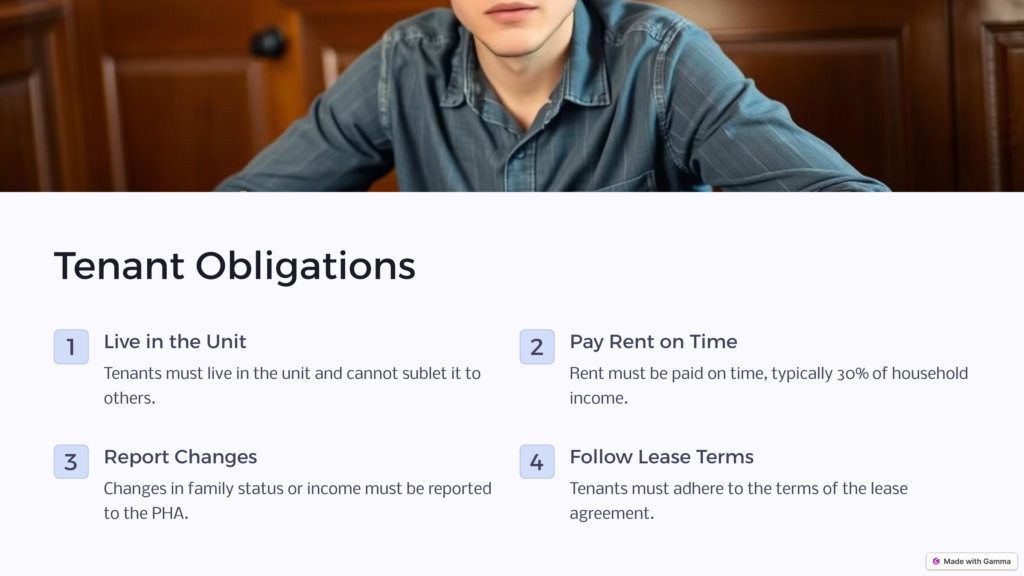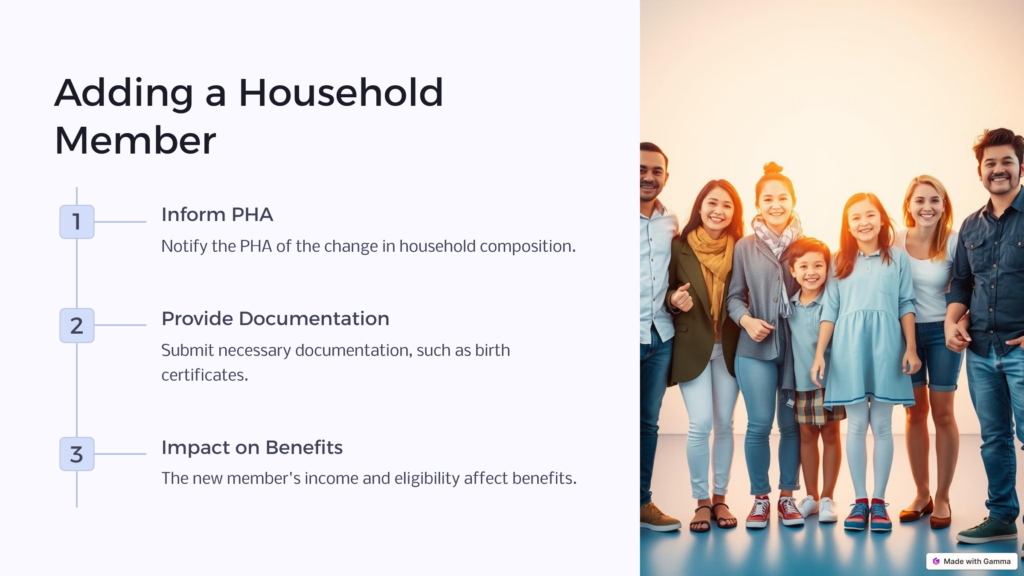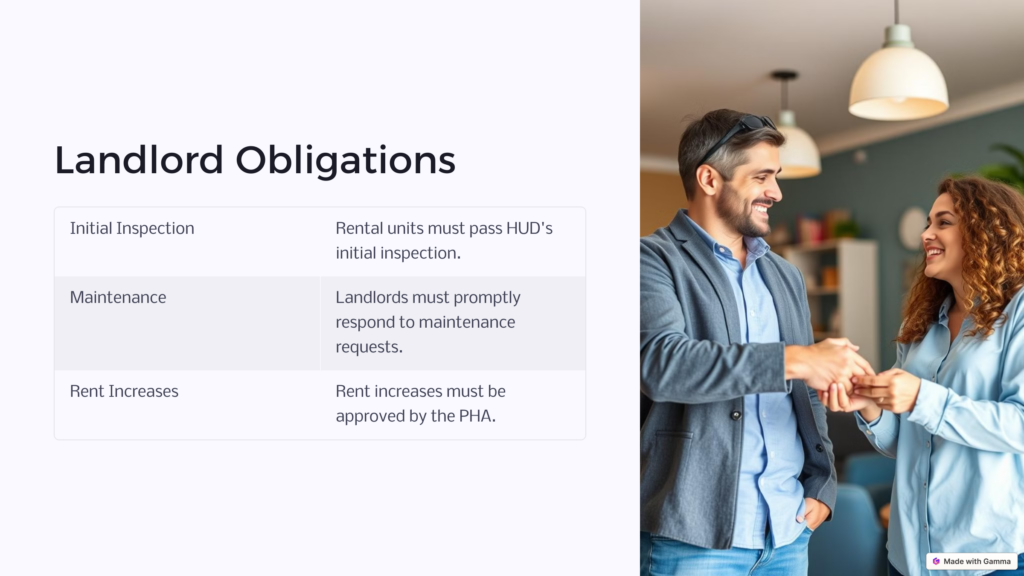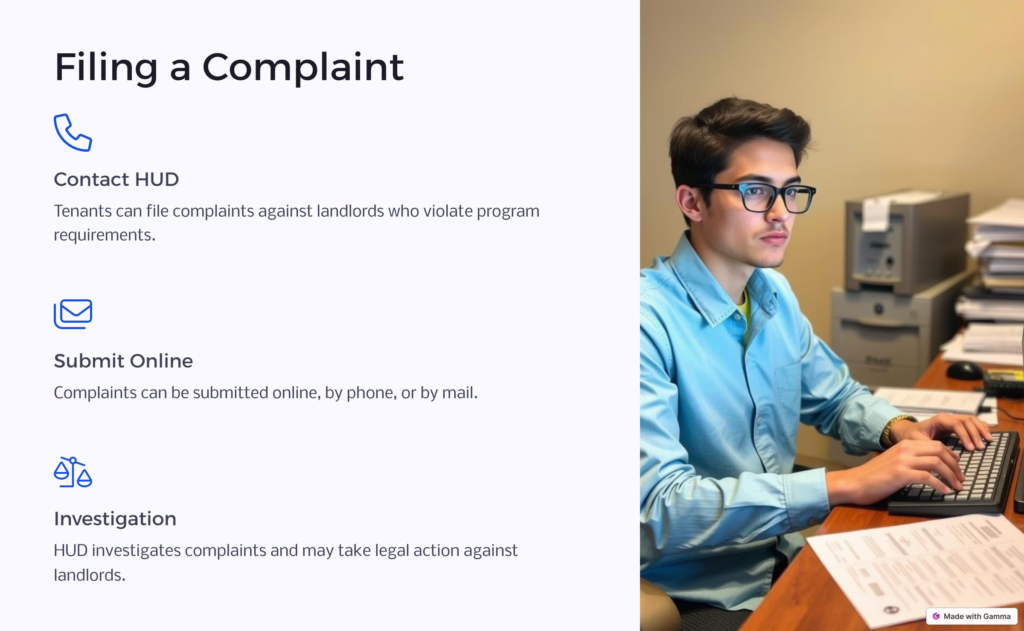The Section 8 Housing Choice Voucher program, administered by HUD and local public housing agencies. Section 8 helps millions of people across the country. Designed to help low income, disabled, and elderly households find safe places to live, the Section 8 HCV program insists on compliance with specific regulations. These rules protect the integrity of the housing choice voucher program and ensure that those who need assistance can get the help they need.
10 Rules For Tenants to Follow
There are several specific rules a public housing authority may have in place, including any of the following:
- Live in the Unit
- Pay Rent on Time
- Pay Security Deposit
- Report Any Changes in Family Status
- Report Any Changes in Income
- Follow the Terms of Lease
- Don’t Allow Guests Longer Than 14 Consecutive Days
- Request Approval for New Roommates
- Allow PHA Inspections
- Avoid Illegal Activity
What Are The Section 8 Family Obligations?
Every household that receives Section 8 housing choice voucher assistance must agree to abide by HUD’s strict tenant rules and obligations – also known as their family obligations. The goal of Section 8 is to help the vulnerable members of our society find safe and affordable housing.
To be deemed safe, a household must be crime-free and drug-free. The Housing Choice Voucher Program holds participants to very high standards of behavior. This is to ensure that the housing environment is safe for everyone. Before you apply for Section 8 housing assistance, you should fully understand your obligations.
Let’s take a closer look at the rules and regulations for Section 8 tenants.

1. Live in the Unit
PHAs make sure that the people with a Section 8 voucher actually live in their rental unit. This helps HUD and your local housing authority ensure that there’s no fraud in the process. You cannot, for example, qualify for Section 8 assistance, pay your approved rental amount, and then sublet your unit to someone else. You and your family must be the ones living in the unit, and only approved family members can live with you.
2. Pay Rent on Time
As part of your lease contract, you’re expected to pay your portion of the rent on time. This is true for anyone who rents a place to live, but it’s especially true for those who participate in the Section 8 housing choice voucher program.
According to a recent survey, there is a growing number of Section 8 tenants who are increasingly unable to pay their rent. “For many months, our Department has worked with landlords and owners who do business with HUD to ensure they access the Emergency Rental Assistance Program and do everything they can to keep people housed,” said HUD Secretary Marcia L. Fudge.
For most participants in the Section 8 HCV program, the cost of rent amounts to roughly 30% of their household’s adjusted income. Your portion of the rent must be an amount you’re willing and able to pay each month. Not only do you risk getting into hot water with your landlord if you don’t comply, but you also run the chance of being asked to leave the Section 8 housing choice program, which means no more rental assistance for you.
3. Pay Security Deposit
Sometimes, renters are required to pay a security deposit directly to their landlord when they sign a rental agreement. You should try to find out if this is expected before choosing and committing to a specific rental unit. If a security deposit is required, you’re expected to pay it on your own, without assistance from HUD.
4. Report Any Changes in Family Status
Your eligibility for Section 8 voucher assistance is calculated based on your family income. This is the total amount of annual income your household earns, plus the number of people in your household. If you add or remove members of your household, you must notify your PHA immediately so it can recalculate your appropriate rent payment. If you’re adding members and adding income, you may see an increase in the amount of rent that you owe per month, or vice versa if you’re losing members and their income.
5. Report Any Changes in Income
If you experience substantial changes in income, you must notify your local housing authority as soon as possible. The goal of the Section 8 housing program is to ensure that your household is paying roughly 30% of its income in rent every month. If your take-home increases, then the local housing authority will need to increase your portion of the rent. The same is true if your annual income decreases. The housing authority will need to lower your monthly rental amount to make sure you remain within the 30% guideline.
6. Follow the Terms of Lease
This may go without saying, but to remain in good standing with the Section 8 housing assistance program, you’ll need to carefully and consistently abide by the terms of the lease you signed with your landlord. The same is also true for your landlord.
7. Don’t Allow Guests Longer Than 14 Consecutive Days
 Section 8 guidelines are clear—only approved family members can live with you. If you accept long-term guests without notifying your PHA, then you are in violation of your Section 8 agreement. Someone who lives with you for more than 14 consecutive days is considered a member of your household, and the housing authority will need to recalculate your rent payment amount according to your new household composition, along with any family income your guest can contribute.
Section 8 guidelines are clear—only approved family members can live with you. If you accept long-term guests without notifying your PHA, then you are in violation of your Section 8 agreement. Someone who lives with you for more than 14 consecutive days is considered a member of your household, and the housing authority will need to recalculate your rent payment amount according to your new household composition, along with any family income your guest can contribute.
HUD rules stipulate that a guest may not stay with you for more than 21 total days within any given year. Your relationship doesn’t matter. Even if your guest is a parent, child, or other blood relative, if they’re not noted in your paperwork and haven’t gone through the proper background checks and approval process, they cannot stay with you long-term.
Who Can Live with You?
Under Section 8, you can generally live with anyone considered a part of your household. Your household typically includes yourself, your spouse (if applicable), and any dependent family members. Dependent family members may include children, parents, and siblings, but this can vary based on the specific PHA’s policies. Non-dependents, such as adult children, extended family members, or friends, are not automatically considered part of your household for Section 8 purposes unless they are officially recognized as caregivers for elderly or disabled participants.
Housing restrictions and qualifications
Section 8 has certain housing restrictions and qualifications that participants must meet. These include:
Income Limits
To be eligible for Section 8, your household’s income must not exceed the income limits set by the PHA for your area. The exact limits can vary depending on family size and the local cost of living.
Citizenship or Eligible Immigration Status
You must be a U.S. citizen or have eligible immigration status to qualify for Section 8 assistance.
Criminal Background Checks
PHAs conduct criminal background checks on all adult household members. Some criminal convictions, particularly drug-related or violent crimes, may disqualify applicants.
Household Size
The size of the rental unit must be appropriate for the household’s size. Each PHA sets its own guidelines for determining the appropriate unit size based on family size and composition.
Rental Unit Requirements
The rental unit must meet HUD’s Housing Quality Standards (HQS). These standards ensure the rental unit is safe, decent, and in good condition.
Adding Someone to Your Household

You must follow the PHA’s procedures if you wish to add someone to your household, such as a new family member or caregiver. This typically involves informing the PHA of the change in your household composition and providing any necessary documentation, such as birth certificates or legal guardianship papers.
It’s crucial to be aware that adding a new household member can affect your Section 8 benefits. If the new member has income, it will be considered when determining your household’s total income. If the combined income exceeds the income limit for your household size, you may no longer qualify for Section 8 or may receive reduced assistance.
Also, if the new household member is not eligible for Section 8 assistance (e.g., they are not a U.S. citizen or lack eligible immigration status, or for any other reason), it could also impact your eligibility.
Impact on Benefits
Adding someone to your household can have various effects on your Section 8 benefits, depending on their income, eligibility status, and the local PHA policies. Potential outcomes include:
Increased Benefits
If the new household member has little to no income, it might lead to an increase in your Section 8 subsidy. This is because the PHA considers the total household income to calculate the level of assistance.
Reduced Benefits
If the new household member has income that pushes the household above the income limit, your Section 8 subsidy may decrease or terminate. This could lead to higher rent payments on your part.
Loss of Eligibility
If the new household member is not eligible for Section 8 assistance (for any reason), it might also impact your eligibility. The PHA may require the ineligible member to move out of the unit.
Unit Size and Overcrowding
Adding a new household member may affect your current rental unit’s size appropriateness based on PHA guidelines. If the unit becomes overcrowded, you might need to find a larger unit that fits your household size.
PHA Policy Differences
Remember that PHAs can have their own policies and rules regarding adding household members, so it’s essential to consult with your local PHA for guidance.
8. Request Approval for New Roommates
Your rent amount is calculated based on your household annual income, plus the number of people within your household. If anything changes, you are required to notify your public housing authority so that it can recalculate your rent payment if needed. Everyone who is accepted into the Section 8 housing voucher program must pass a background check. If you’d like to take on a new roommate, that person must go through the approval process.
9. Allow PHA Inspections
On an annual basis, your housing authority will need to inspect your rental unit to ensure that both you and your landlord are adhering to appropriate rules and regulations. That means that you’re taking care of the unit as specified in your lease, and so is your landlord. As part of your agreement to participate in the Section 8 program, you must allow your housing authority access to your rental unit for these inspections when requested.
10. Avoid Illegal Activity
HUD has no tolerance for criminal activity in Section 8 housing. This is particularly true for drug-related crimes carried out within your home. Anyone who lives in your household will need to pass a background check before being approved. If your public housing authority learns that you or someone in your household has been found guilty of a crime on the rental premises, you will likely be removed from the Section 8 program.
HUD Eviction Rules
In 2021, the Department of Housing and Urban Development in the USA issued new requirements considering the eviction of tenants in public housing subsidized by HUD and some project-based rental assistance properties. The new rules outlined that all landlords must give tenants 30 days’ notice of an eviction, and include information about ERA support in their notice.
Additionally, the rules also require landlords and property owners inform all tenants in public housing about their options for accessing Emergency Rental Assistance. HUD also released extensive eviction prevention resources for housing authorities, and created an inaugural eviction protection program, which will provide $20 million in funding to eviction diversion and protection services for low-income tenants that may be at risk of eviction.
Along with these new rules, HUD also outlined various measures taken to help minimize unfair evictions. The HUD rules prohibit landlords from evicting renters based on discrimination. Evictions cannot be issued based on the following characteristics:
- Race
- Color
- Religion
- Sex (including sexual orientation or gender identity)
- National origin (origin country or ancestry)
- Disability (physical or mental impairments which substantially limit an individual’s life or bodily function)
- Familial status (Parents or guardians living with a child or children, or pregnancy)
Even if the eviction decision made by a landlord was made partially based on one of these reasons, the landlord would violate the Fair Housing Act. If you were subject to eviction after being behind on your rent, your landlord still wouldn’t have the right to evict you based on discrimination.
If any resident believes their rights have been violated or they are being evicted unfairly, they can file a fair housing complaint with the Department of Housing and Urban Development, either by calling the group, or filing on the HUD website.
If you file a complaint with HUD, you will be asked to provide documents and facts supporting your claim. HUD will also obtain facts and documents from the housing provider. During the investigation, the HUD team will attempt to resolve the complaint using a voluntary process called “conciliation”. However, if discrimination is found to have occurred, a charge will be issued against the housing provider. The HUD team can also ask housing providers to stop evictions during an investigation.
If the housing provider refuses to stop the eviction, HUD can ask the US Department of Justice to file a federal lawsuit in court to stay the eviction until the investigation is completed.
Section 8 Rules for Landlords

Landlords who participate in the Section 8 housing voucher program must also abide by HUD’s rules and regulations or face removal from the program. Any participating landlord must abide by the state’s landlord-tenant law in addition to stipulations set forth by HUD. Some states require all landlords to accept Section 8 tenants, so before choosing and applying for a unit, make sure you understand whether the landlord you’re working with has the legal right to refuse Section 8 tenants.
Section 8 landlords agree to have their rental units inspected for initial HUD approval to ensure that they meet HUD standards for safe, clean, and respectable housing for its Section 8 renters. If any unit doesn’t pass the initial inspection, the landlord will be given a specified timeframe to make improvements. The PHA will carry out yearly inspections to make sure the housing environment remains appropriate for tenants.
Just like the tenant, the landlord must comply with the stipulations of the lease agreement. This typically entails promptly responding to maintenance concerns or handling complaints about parking or other tenants. Before raising your rent, the landlord must notify the local public housing authority, who will then verify that the increase is fair market rent. This kind of rent increase can only happen once per year.
Tenant Rights
Under the Fair Housing Act, every tenant has the right to be treated equally under the law. This means that a landlord cannot legally participate in practices like charging different rental rates for different types of renters, delaying or not performing maintenance tasks for some groups of renters, limiting any services, renter privileges, or property facility access to any group of renters based on race, gender, ethnicity, disability, religion, or family status.
To enforce the Fair Housing Act, HUD may send test renters to view properties in order to determine whether landlords are engaging in any unfair practices. If you feel your tenant rights have been violated during your search for housing and any subsequent rental, you can report this activity to HUD, who will then investigate the claim and determine whether any further legal action is necessary.
Filing a Complaint Against Your Landlord

Landlords who participate in the Section 8 housing program are required to provide safe, decent, and reliable housing for their low-income tenants. However, the sad truth is that not all Section 8 landlords meet these expectations. For example, some landlords may discriminate against tenants in ways that violate the Fair Housing Act. Others may fail to maintain the property in which tenants live, letting it fall below standards required by Section 8 participation, or they may not honor some portions of the lease agreement in place.
When landlords fail to meet program requirements for any reason, tenants can reach out to the Office of Fair Housing and Equal Opportunity, which falls under the umbrella of the U.S. Department of Housing and Urban Development, or HUD.
If you’re a Section 8 tenant and you believe your landlord is failing to live up to program expectations, you can report them by calling the Multifamily Housing Complaint Line at 800-685-8470 or TTY 800-432-2209. You also may file your complaint through FHEO by submitting it online, by phone at 1-800-669-9777 or 1-800-877-8339, or by submitting your claim by either email or regular U.S. mail using this form.
It’s important to file your complaint as early as possible. FHEO typically requires that a formal complaint be filed within one year of the last date of a landlord’s alleged discrimination against a tenant. In some cases, a Section 8 inspection of the property may need to be scheduled to deter
ine whether the rental unit is being appropriately maintained.
After a complaint is filed, an investigation will take place. This investigation may result in voluntary compliance with a solution that both parties agree to. Or, in cases where the landlord has broken the law, legal action may be taken against the landlord.
Filing a Complaint Against Your Tenant
Tenants who qualify for and live in HUD Section 8 housing have responsibilities they must meet when it comes to the tenant/landlord relationship. For example, tenants must actually live in their unit – they can’t sublease it to anyone else, including family members. Tenants must pay their portion of the monthly rent on time and consistently, and they usually must pay their own security deposit.
All Section 8 renters also must refrain from using the rented unit for any kind of illegal activity. Tenants must also abide by the stipulations of their respective lease agreements. This can include everything from keeping the rented unit free of damage to keeping noise to a reasonable level. It’s especially important to address any issues or noise complaints brought forward by other tenants.
If you are a landlord with Section 8 tenants who are neglecting their responsibilities, you may file a complaint against them. As a landlord, you are likely familiar with your local public housing authority, which is the entity that serves as local administrator of the U.S. Department of Housing and Urban Development’s Section 8 program. Your established contact at your PHA is the best person to contact with information about your tenant and to begin a formal complaint.
If you suspect that your tenants are fraudulently renting under the Section 8 program, you can report that information using HUD’s fraud hotline. Once your complaint is received, an investigation will move forward. Tenants found in violation of Section 8 guidelines may be evicted from their homes and removed from Section 8 eligibility.
Fairness to All in Rules and Regulations
HUD’s Section 8 housing voucher rental assistance program fulfills an important and vital need for many low-income families across the country. Section 8 helps them access safe and affordable housing, where they can raise their families and be productive citizens.
To protect both the integrity of the housing choice program and the living environment for those who participate in the program, HUD has put in place careful rules and regulations for everyone who participates in the Section 8 voucher program. Before you apply for a Section 8 housing choice voucher, make sure you fully understand your rights and obligations, along with the obligations of your landlord. This helps ensure that Section 8 housing is safe and fair for everyone involved.
 Benefits.com Advisors
Benefits.com Advisors
With expertise spanning local, state, and federal benefit programs, our team is dedicated to guiding individuals towards the perfect program tailored to their unique circumstances.
Rise to the top with Peak Benefits!
Join our Peak Benefits Newsletter for the latest news, resources, and offers on all things government benefits.



















